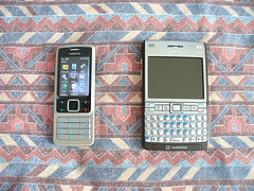MobileActive was in an article in the Boston Globe yesterday, titled "Ringtones with a conscience." The reporter took her stories from the MobileActive blog and compiled them into an article that describes some of the ways that mobile phones are being used for social good. The article is below, with links to the original MobileActive stories.
The mobile phone is the new call to action.
A Mexican wolf's eerie howl does double duty as a ringtone and a reminder of habitat destruction. Barack Obama's campaign offers text message updates, wallpaper, and ringtones with sound bites like "What I do oppose is a dumb war" over a hip-hop beat. A local community support group has turned volunteers with an hour or two between tasks into a network of translators.
Often seen as a platform for socializing or time-wasting novelties, cellphones also present a unique opportunity for social good. Portable and personal, the gadgets provide a discreet channel for people to receive information and a broadcast platform to rally like-minded activists around shared interests.
In other parts of the world where landlines and broadband connections may be scarce, cellphones have been used in election monitoring; to bring banking and economic development to poor, rural areas; or to remind HIV patients to take medication. Now in the United States, cellphones are beginning to catch on as an agent of change, too.
Text message use in the United States has steadily increased, from 65 million people who sent or received messages in January 2006 to 108 million this past January, according to M:Metrics. At the same time, "people are inundated with e-mail . . . they have e-mail coming out of their ears at home, at work, you name it," said Katrin Verclas, cofounder of MobileActive.org, a network for organizations focused on using cellphones for social impact. "The phone is still a medium where you can reach people, and if you have a relationship with an organization or really care about an issue," people are willing to get that information on their handsets.
Cellphone activism runs a wide gamut. It offers people the luxury of getting information they can act on immediately, without returning to their home computers.
For instance, a person browsing a store's electronics or apparel aisles who is interested in finding out about a company's environmental practices can text "cc" and the company's name to 30644 to get Climate Counts' report about the company. A diner browsing a menu for the most sustainable seafood selection can text the word "fish" and the name of a particular species to the same number to get information from the Blue Ocean Institute. A diner considering monkfish would get a reply indicating there are "some environmental concerns" and that catfish, rainbow trout, or tilapia may be a friendlier option.
It also provides a private channel that may be a good medium to connect with people about sensitive issues.
SexInfo, for instance, a text-messaging information line launched in San Francisco, is an effort to reach teens who may have pressing questions about topics they feel they cannot talk about.
People who send a text message to SexInfo's short-code number will receive a message that says: "Txt 1 if ur condom broke Txt 3 if s/he's cheating on u Txt 5 for STD info Txt 6 if ur not sure uwant2havesex."
The Asian Community Development Corporation in Boston has pioneered a technology called Speakeasy that turns volunteers with knowledge of a foreign language and a cellphone into a network of translators. In previous pilot programs, a non-native speaker confronted with a confusing situation - whether they were trying to buy a train ticket or talking to a pharmacist - could dial a hot line that connected them with volunteer translators.
"It's about people, community-based groups basically, better leveraging their social capital to do good," said Jeremy Liu, executive director of the Asian CDC. "People talk so much about social capital these days and it's all in the abstract and this is makes it very concrete."
Now, the organization is raising funds to create a foreclosure hot line to give non-English speakers access to someone who speaks their native language - who could be around the corner or hundreds of miles away - with experience in foreclosure counseling.
Presidential candidates offer text message updates, whether it is Obama's campaign urging people to donate by midnight for a chance to dine with the candidate and other supporters or messages from Hillary Clinton's campaign.
Still, cellphone activism may be a more important social force in the rest of the world.
For instance, when an alleged improper conversation between Philippines President Gloria Macapagal-Arroyo and an elections official was made public, it became a popular ringtone. The Camden, Maine, Pop!Tech Accelerator's first project is Project Masiluleke, focused on finding ways to remind people in South Africa to get tested for HIV in a private, sensitive way. The service being developed would embed information about getting tested into the free "callmeback" text messages that people send to friends when they want to talk, but don't have minutes. Everywhere from Montenegro to Nigeria, nongovernmental organizations are using text messages to monitor elections.
But some of it is just fun.
Every time a phone hoots, howls, or yips with one of the free ringtones from the Center for Biological Diversity, people may think of the plight of the Chiricahua leopard frog - or they might just check their messages.
Photo credit to osde.info.

Post new comment